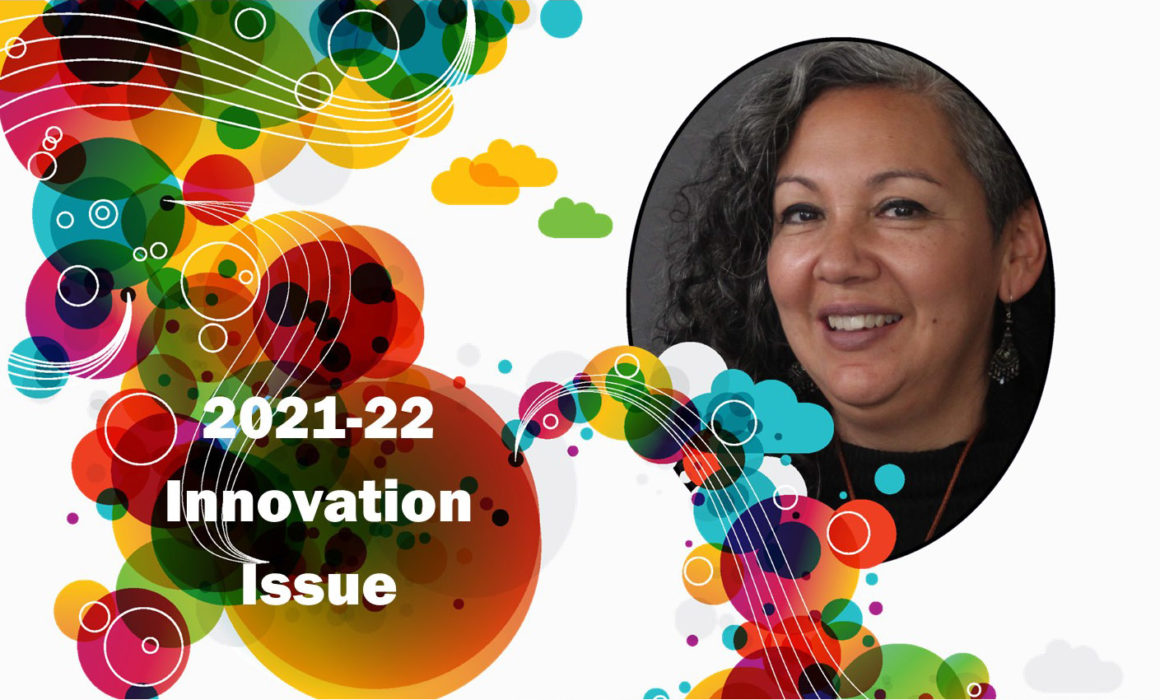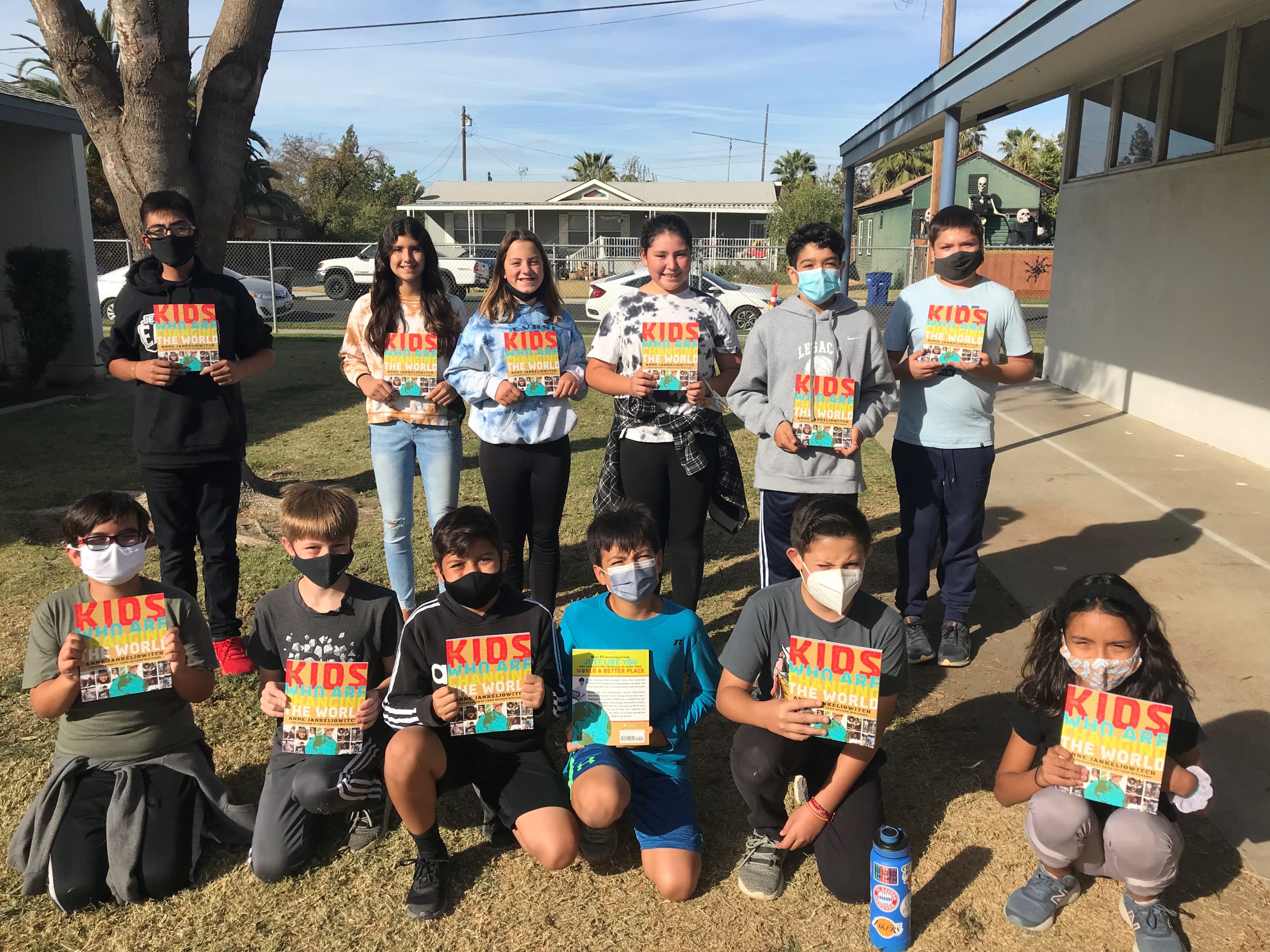
Our 2021-22 Innovation Issue salutes educators who dare to imagine a world where life is better for their students:
“I recruit kids who love to read and some who are reluctant readers. It builds a sense of community, as students become better thinkers, better readers and friends.”
Food for thought is on the menu when middle school students attend the Sí Se Puede Book Club during lunch at Jefferson Academy in Hanford.
Students, who have just read Kids Who Are Changing the World by Anne Jankéliowitch, eagerly discuss the social activism of students in the book.
“I was impressed with Olivia Bouler, who took action when she heard about the oil spill in the Gulf of Mexico,” eighth grader Marlee Liniger tells her classmates, describing how the 11-year-old from New York partnered with the Audubon Society to sell her paintings of birds, raising $200,000 for gulf recovery efforts.

Students from Bustos-Pelayo’s book club.
Students are in the classroom of Josefa Bustos-Pelayo, whose love of reading inspires their passion for the written word. This old-fashioned book club is bringing students together, fostering critical thinking, raising awareness of important issues, and letting students know that they, too, can change the world and make a difference.
“Reading books is a way of opening students’ eyes to the world,” says Bustos-Pelayo, a member of the Hanford Elementary Teachers Association. Books for her program are provided via 2019-20 and 2020-21 innovation grants from CTA’s Institute for Learning. The club, currently with 23 students, meets monthly during lunchtime. Occasionally special guests Zoom in; when the pandemic wanes, Bustos-Pelayo will take students on field trips.
“I recruit kids who love to read and some who are reluctant readers. I think it builds a sense of community, as students become better thinkers, better readers and friends.”
Her focus this year is on the environment, because of students’ concern about climate change at the STEAM-centered school. They will read about Rachel Carson, whose influential book Silent Spring and other writings are credited with catalyzing the global environmental movement.
“As the students read the works of authors and scientists, they will not only be learning content, but the craft of writing like a scientist and environmentalist. So, in the spirit of Rachel Carson as the mother of environmental studies, we will uncover her love for the environment, her social activism, her passion for writing, and be inspired by her unrelenting work.”
Students will read The Boy Who Harnessed the Wind by William Kamkwamba, the true story of a 13-year-old Malawian boy who is thrown out of school when his family can no longer afford the fees, then sneaks into the library and learns how to build a windmill to save his village from a famine.
Other assignments will be on the political environment. This Book Is Anti-Racist: 20 Lessons on How to Wake Up, Take Action, and Do the Work by Tiffany Jewell will encourage students in the book club to take action of their own.
Bustos-Pelayo’s book club was on hiatus during the pandemic shutdown, but in 2019 the club’s focus was on Latino writers and Hispanic heritage. This was a natural fit, since she teaches in the school’s dual immersion program, and the majority of students at Jefferson Academy are Latino.
“I grew up in nearby Fresno and have always had a love of reading,” says Bustos-Pelayo. “But I didn’t read a book by a Latino author until my senior year of high school. A teacher gave us a list of books to choose from, and I saw a Hispanic name — Isabel Allende — author of The House of the Spirits. After that I bought all her books because I connected so much with this eccentric character with curly long hair and a sense of magical surrealism.”
She attended Merrill College at UC Santa Cruz, and discovered she had a passion for Spanish literature.
“I decided that I wanted to become a teacher that students could relate to, and that I wanted my students to love books as much as I do. I am constantly going to book fairs and even went to a book fair in Spain to find excellent Spanish literature.”
Reading, she believes, has changed with the Accelerated Reader and other programs that give students “points” for books rather than fostering a love of reading. Book reports and testing students on books can sometimes result in the opposite of engagement and reading for pleasure.
Students in her book club are reading for fun, and they have shown a marked improvement in reading. At the end of the academic year in 2019, many had increased their reading ability, and some improved by an entire grade level.
“Oh my gosh, I was shocked,” she says. “I asked students why their reading levels had jumped, and they said it was the book club. It just shows that finding books that truly engage students makes
all the difference.”
The Discussion 0 comments Post a Comment